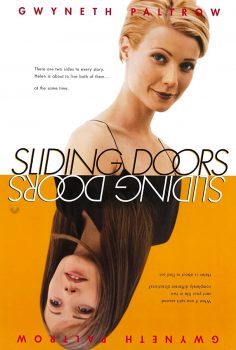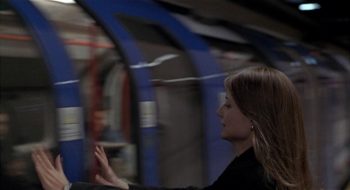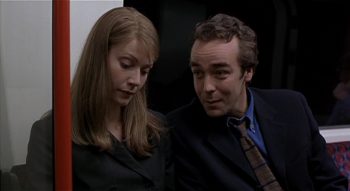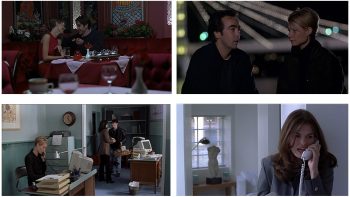Now Streaming: Sliding Doors

Although the 1998 romantic comedy Sliding Doors starring Gwyneth Paltrow, John Hannah, John Lynch, and Jeanne Tripplehorn may not immediately spring to mind as a science fiction film, it is one of the two micro-alternate history films that can be used to really explore the concept of alternate history on the personal level, the other being the 1946 Christmas Classic It’s a Wonderful Life.
Both films focus their attention on how things would have been different if things had worked out differently. In George Bailey’s case, Clarence shows him what Bedford Falls would have been like if he had never been born. Sliding Doors explores two alternatives for Paltrow’s Helen.
The film opens with Helen (Paltrow) heading into her public relations office for a normal day. When she arrives and learns that she has been fired on trumped up charges, she heads back home. The film shows her both catching her train and missing the train by moments, setting into motion the branching timelines for Helen’s life.
In the world in which she catches her train, she meets James (Hannah) who tries to jolly her out of her funk. He fails and she returns to her apartment to discover that her boyfriend, Gerry (Lynch) is having an affair with Lydia (Tripplehorn). Fleeing the apartment, she eventually finds herself staying with her friend Anna (Zara Turner) and bumping into James again in a local restaurant. Over the next several weeks, she and James become friends, and possibly more, and he encourages her to open her own public relations firm.
In the world in which she misses her train, Helen decides to take a cab home and finds herself on the wrong end of a mugging. Stopping off at the hospital, by the time she gets him, all evidence of Gerry’s affair is long gone. While Gerry continues to struggle with his novel, Helen begins working two jobs to try to make ends meet. Gerry continues his affair and also gaslights Helen whenever she begins to question him about things.

To help the viewer distinguish between the two timelines, in the early portions of the film the Helen who missed the train has a plaster on her forehead where she was injured in the mugging. Eventually, though, the Helen who made her train gets a haircut and dies her hair blonde to help make a break from the life she had been leading with Gerry.
The filmmakers were not particularly interested in the mechanism behind the altered timelines, although they do have a few touchpoints throughout the movie when the Helen in both realities experiences in the same thing, indicating an awareness that not everything is based on our choices. Despite only being their means to an end, however, they have done an excellent job of looking at a person who is moving through two alternative worlds.
Instead, the focus of the film is on Helen’s relationships with Gerry and James. In her relationship with Gerry, Helen feels comfortable. She goes through life blissfully unaware of what a jerk he is, even as the viewer sees that he’s sponging off her, self-absorbed, and, of course, cheating on her. At the same time, while a past is hinted at between Lydia and Gerry, there is no real indication that their relationship is about anything more than sex and, for Lydia, a power play. Even if Helen can’t see it, or allows herself to be willfully blinded to it, she is in an unhealthy relationship with Gerry.
James, on the other hand, is almost perfect. From the moment he is introduced, picking up an earring that Helen dropped on an elevator, he is aware of Helen as an individual. When he meets her again on the train, he warns her of his stop so she won’t think he’s following her when he gets off the train. He later encourages her to start her own company. However, while Gerry is dealing with a Helen who thinks she is happy, James is trying to build a relationship with a Helen who has recently had to deal with Gerry’s infidelity, and when things don’t go smoothly with James, she assumes the worst.
In addition to showing two sides of her life, the film has another dichotomy. In the world in which she missed the train, Helen’s life orbits around Gerry and Lydia, both of whom are shown as horrible people. Although Helen doesn’t meet, or even know of, Lydia, Gerry’s lover is scheming and working to destroy their relationship, not that Gerry needs any help in that regard. He does show sympathy to Helen after her attack, but he mostly focuses on his own needs. How truly awful Gerry is can be seen in the moments where he unloads his issues on his friend Russell (Douglas McFerran), who he also uses as a blind when he wants to get away from Helen to be with Lydia. Russell, fully aware of Gerry’s situation, finds the awkward situation his friend gets into as hysterical and something Gerry deserves.

On the other hand, the Helen who made the train has extracted herself from the Gerry-Lydia situation, although she is aware of Lydia. In that world, she not only has the support of James and his friend Clive (Paul Brightwell), who hires her new PR firm to help with the opening of his restaurant, but she also spends more time with her supportive friend Anna, who suspected Gerry was a jerk, but mostly kept her opinions to herself because Helen seemed to be in love with him. Not only does the film look at how decisions can change lives, it also looks at how having a supportive group of friends can improve a person’s life.
One of those movies which demonstrates how much science fictional tropes have been adopted by the mainstream, Sliding Doors was not marketed to appeal to the genre fan, even though its basic premise is something that science fiction has been exploring for decades. A genre fan who watches the film expecting it to be a science fiction film is likely to be disappointed, but Sliding Doors offers a good exploration of the genre trope of points of divergence and multiple timelines.
Sliding Doors is currently streaming on Roku, Vudu, Tubi, PlutoTV, Filmrise, and IMDB TV. It can be rented or purchased on Amazon, Google Play, YouTube, Vudu, Microsoft, and AppleTV. It is also available for purchase on DVD and BluRay.

 Steven H Silver is a eiighteen-time Hugo Award nominee and was the publisher of the Hugo-nominated fanzine Argentus as well as the editor and publisher of ISFiC Press for 8 years. He has also edited books for DAW, NESFA Press, and ZNB. His most recent anthology is Alternate Peace and his novel After Hastings was published in 2020. Steven has chaired the first Midwest Construction, Windycon three times, and the SFWA Nebula Conference 6 times. He was programming chair for Chicon 2000 and Vice Chair of Chicon 7.
Steven H Silver is a eiighteen-time Hugo Award nominee and was the publisher of the Hugo-nominated fanzine Argentus as well as the editor and publisher of ISFiC Press for 8 years. He has also edited books for DAW, NESFA Press, and ZNB. His most recent anthology is Alternate Peace and his novel After Hastings was published in 2020. Steven has chaired the first Midwest Construction, Windycon three times, and the SFWA Nebula Conference 6 times. He was programming chair for Chicon 2000 and Vice Chair of Chicon 7.
A thoughtful choice and well analysed Steven. I really like John Hannah’s work, he’s able to tackle a great variety of roles. Also a movie that will forever stick in my mind as the one I watched the night before leaving for my first overseas trip (to Europe but not London, so no Sliding Door meeting with Helen for me unfortunately). I think the best treatment of alternative timelines I’ve read are the Paratime works of H. Beam Piper, although I know there are many other writers who have tackled the subject (and film makers – the plot of quite a few Twilight Zone episodes evolved from this concept).